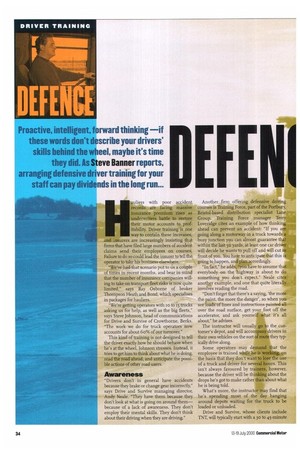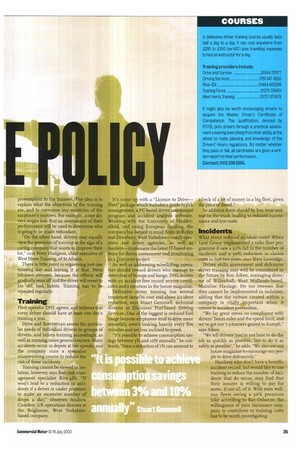Proactive, intelligent, forward thinking if these words don't describe your
Page 36

Page 37

If you've noticed an error in this article please click here to report it so we can fix it.
drivers' 6. skills behind the wheel, maybe it's time they did. As Steve Banner reports, arranging defensive driver training for your staff can pay dividends in the long run...
Hauliers with poor accident records are facing massive insurance premium rises as underwriters battle to restore their motor accounts to profitability. Driver training is one way to contain these increases, and insurers are increasingly insisting that firms that have filed large numbers of accident claims send their employees on courses. Failure to do so could lead the insurer to tell the operator to take his business elsewhere.
"We've had that scenario put to us a couple of times in recent months, and bear in mind that the number of insurance companies willing to take on transport fleet risks is now quite limited," says Ray Osborne of broker Thompson Heath and Bond, which specialises in packages for hauliers.
"We're getting operators with to to 15 trucks asking us for help, as well as the big fleets," says Steve Johnson, head of communications for Drive and Survive of Crowthorne, Berks. "The work we do for truck operators now accounts for about Go% of our turnover."
This kind of training is not designed to tell the driver exactly how he should behave when he's at the wheel, Johnson stresses. Instead, it tries to get him to think about what he is doing, read the road ahead, and anticipate the possible actions of other road users.
Awareness
"Drivers don't in general have accidents because they brake or change gear incorrectly," says Drive and Survive managing director, Andy Neale. "They have them because they don't look at what is going on around them— because of a lack of awareness. They don't employ their mental skills. They don't think about their driving when they are driving."
Another firm offering defensive driving courses is Training Force, part of the Portbury, Bristol-based distribution specialist Lane Group. Training Force manager Terry Loveridge cites an example of how thinking ahead can prevent an accident: "If you are going along a motorway in a truck towards a busy junction you can almost guarantee that within the last 50 yards, at least one car driver will decide he wants to pull off and will cut in front of you. You have to anticipate that this is going to happen, and plan accordingly.
"In fact," he adds, "you have to assume that everybody on the highway is about to do something you don't expect." Neale cites another example, and one that quite literally involves reading the road.
"Don't forget that there's a saying, 'the more the paint, the more the danger', so when you see loailrof lines and instructions painted all over the road surface, get your foot off the accelerator, and ask yourself what it's all about," he advises.
The instructor will usually go to the customer's depot, and will accompany drivers in their own vehicles on the sort of route they typically drive along.
Some operators may demand that the employee is trained while he is working, on the basis that they don't want to lose the use of a truck and driver for several hours. This isn't always favoured by trainers, however, because the driver will be thinking about the drops he's got to make rather than about what he is being told.
What's more, the instructor may find that he's spending most of the day hanging around depots waiting for the truck to be loaded or unloaded.
Drive and Survive, whose clients include TNT, will typically start with a 30 to 45-minute presentation to the trainees. The idea is to explain what the objectives of the training are, and to overcome any suspicion of the employer's motives. For example, some drivers might fear that an assessment of their performance will be used to determine who is going to be made redundant.
"On the other hand, drivers may equally view the provision of training as the sign of a caring company that wants to improve their lot," says Peter Hodgson, chief executive of West Herts Training, of St Albans.
There is little point in organising -just one training day and leaving it at that, Steve lohnson stresses, because the effects will gradually wear off and the driver will revert to his old, bad, habits. Training has to be repeated regularly.
Training
Fleet operator DHL agrees, and believes that every driver should have at least one day's training a year.
Drive and Survive can assess the particular needs of individual drivers or groups of drivers, and tailors training accordingly, as well as running more general courses. Many accidents occur in depots at low speeds, and the company runs a specialist manoeuvring course to reduce the risk of these incidents,
Training cannot be viewed in isolation, however, says fleet risk management specialist .Riva-api. "It won't lead to a reduction in accidents if a driver is under pressure to make an excessive number of drops a day," observes Andre Cuerden, UK operations director at the Brighouse, West Yorkshirebased company.
It's come up with a "Licence to Drive— Fleet" package which includes a guide to risk management, a PC-based driver assessment program and accident analysis software. Working with the University of Huddersfield, and using European funding, the company has helped 13 small firms in Batley and Dewsbury, West Yorkshire—coach operators and driver agencies, as well as hauliers—implement the latest IT-based systems for driver assessment and monitoring in a Liso,000 project.
As well as addressing scheduling, operators should reward drivers who manage to steer clear of bumps and bangs. DHL drivers with an accident-free record receive certificates and a mention in the house magazine.
Defensive driver training has several important benefits over and above accident reduction, says Stuart Gemmell, technical director at Ellesmere Port-based Driving Services. One of the biggest is reduced fuel usage because employees tend to drive more smoothly, aren't braking heavily every five minutes and are less inclined to speed.
"Ws possible to achieve consumption savings between 3% and ro% annually," he contends. "Even a reduction of r% can amount to a heck of a lot of money in a big fleet, given the price of diesel."
In addition there should be less wear-andtear on the truck, leading to reduced maintenance and tyre costs.
Incidents
What about reduced accident costs? When Lane Croup implemented a safer fleet programme it saw a 50% fall in the number of incidents and a 30% reduction in claims costs in just two years, says Terry Loveridge.
Driver skills assessment and defensive driver training may well be considered in the future by Ron Aiken, managing director of Willenhall, West Midlands-based, Mainline Haulage. He too stresses that they cannot be implemented in isolation, adding that the culture created within a company is vitally important when it comes to accident prevention.
"We lay great stress on compliance with drivers' hours rules and the speed limit, and we've got our 7.5-tonners geared to 62mph," says Aiken.
"We tell drivers 'you're not here to do the job as quickly as possible, but to do it as safely as possible'," he adds. "We also use our house magazine to encourage our people to drive defensively."
Hauliers who don't have a horrific accident record, but would like to use training to reduce the number of incidents that do occur, may find that their insurer is willing to pay for some, if not all, of it. With even wellrun fleets seeing a 30% premium hike according to Ray Osborne, the willingness of your insurance company to contribute to training costs has to be worth investigating,




































































































